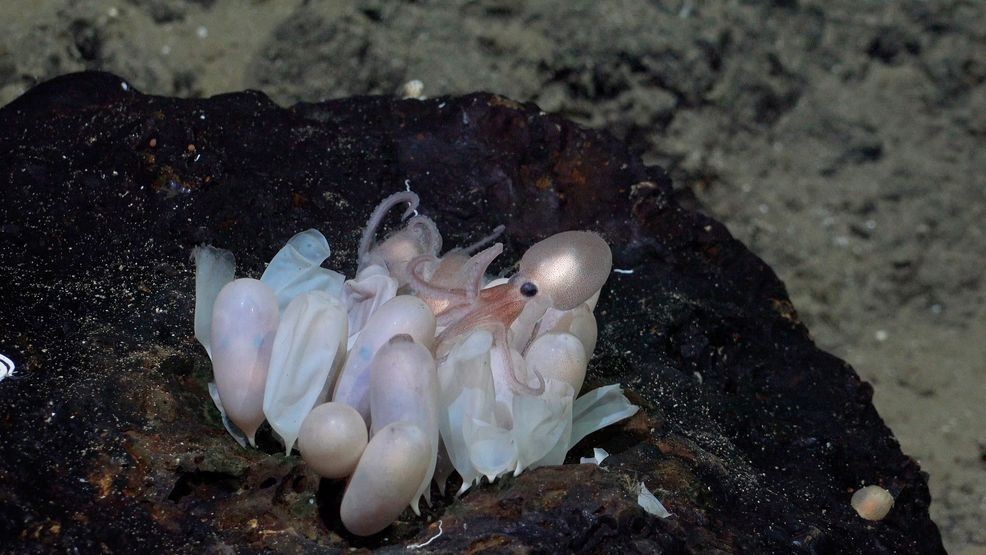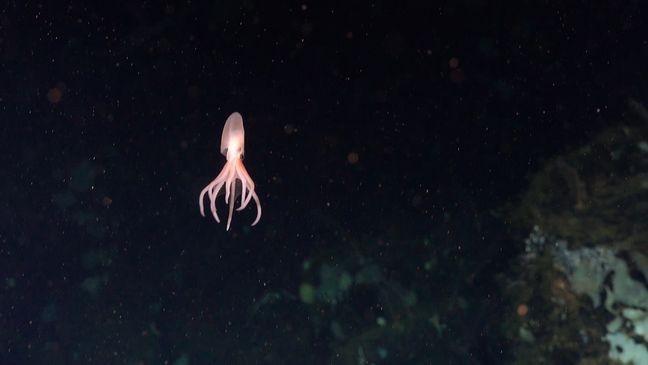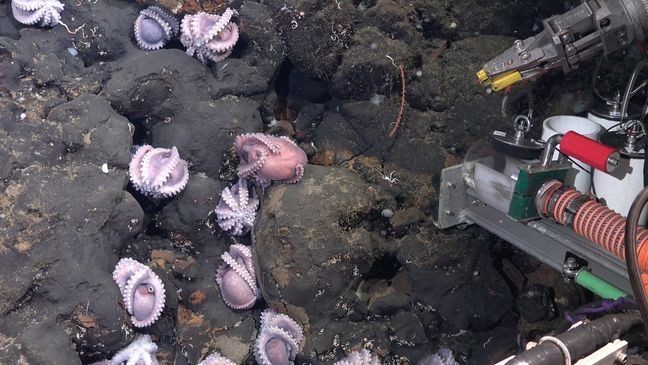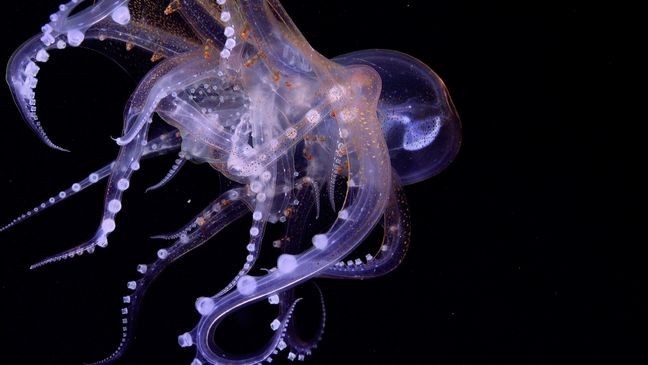PHOTOS: 4 new species of deep-sea octopus discovered off Costa Rica
COSTA RICA (TND) — At least four new species of deep-sea octopus have been discovered by scientists in a 100-square-mile-sized area off Costa Rica.
Officials from the Schmidt Ocean Institute announced their findings Tuesday and said an international team of scientists on the R/V Falkor discovered the new species last year during two expeditions.
"The team found two octopus nurseries affiliated with hydrothermal springs during their first expedition in June," the Schmidt Ocean Institute said. "Six months later, scientists returned to the nurseries and confirmed they appear to be active year-round. They also observed several other new octopus species away from the hydrothermal springs."
Drs. Beth Orcutt of the Bigelow Laboratory for Ocean Sciences led both expeditions along withJorge Cortés of the University of Costa Rica.
{sd-embed class="sd-embedded-media" data-alt="4%20news%20species%20of%20deep-sea%20octopus%20discovered%20off%20Costa%20Rica" data-caption="Brooding%20mother%20octopuses%20often%20curl%20themselves%20up%20with%20tentacles%20and%20suckers%20facing%20out.%20Researchers%20believe%20this%20to%20be%20a%20defensive%20position,%20warning%20predators%20off.%20When%20a%20female%20octopus%20broods%20(which%20can%20be%20a%20timespan%20of%20multiple%20years),%20she%20does%20not%20eat%20and%20dies%20around%20the%20same%20time%20her%20eggs%20hatch.%20This%20group%20was%20observed%20near%20a%20small%20outcrop%20of%20rock%20unofficially%20called%20El%20Dorado%20Hill%20of%20the%20coast%20of%20Costa%20Rica.%20The%20dorado%20octopus%20is%20one%20of%20the%20newly%20identified%20octopus%20species%20found%20during%20the%20expedition.%20(Credit:%20Schmidt%20Ocean%20Institute)%7B%7D" data-duration="" data-externalid="c5821da8-6d06-46c9-a3d8-7275681f83d5" data-mediatype="image" data-renditions="%7B%22large16x9%22:%7B%22blurSigma%22:-1,%22height%22:1371,%22label%22:%22large16x9%22,%22scaleWidth%22:986,%22url%22:%22/resources/media2/16x9/2439/986/0x128/90/c5821da8-6d06-46c9-a3d8-7275681f83d5-FKt231202S061920231205T012648Z120scicamDelicate_Manipulator_SamplingSS.jpg%22,%22width%22:2439,%22x%22:0,%22y%22:128,%22uuid%22:null,%22id%22:%224200bee4-01d0-401c-a62e-2cf465762cff%22,%22preciseWidth%22:null,%22preciseHeight%22:null,%22name%22:%22large16x9Url%22,%22rendition%22:%22large16x9%22,%22labelOrConvertedName%22:%22large16x9%22%7D,%22jumbo16x9%22:%7B%22blurSigma%22:-1,%22height%22:1371,%22label%22:%22jumbo16x9%22,%22scaleWidth%22:1320,%22url%22:%22/resources/media2/16x9/2439/1320/0x128/90/c5821da8-6d06-46c9-a3d8-7275681f83d5-FKt231202S061920231205T012648Z120scicamDelicate_Manipulator_SamplingSS.jpg%22,%22width%22:2439,%22x%22:0,%22y%22:128,%22uuid%22:null,%22id%22:%22bb4ebe1f-649a-4c36-9c80-e45e0d0f0886%22,%22preciseWidth%22:null,%22preciseHeight%22:null,%22name%22:%22jumbo16x9Url%22,%22rendition%22:%22jumbo16x9%22,%22labelOrConvertedName%22:%22jumbo16x9%22%7D,%22small16x9%22:%7B%22blurSigma%22:-1,%22height%22:1371,%22label%22:%22small16x9%22,%22scaleWidth%22:160,%22url%22:%22/resources/media2/16x9/2439/160/0x128/90/c5821da8-6d06-46c9-a3d8-7275681f83d5-FKt231202S061920231205T012648Z120scicamDelicate_Manipulator_SamplingSS.jpg%22,%22width%22:2439,%22x%22:0,%22y%22:128,%22uuid%22:null,%22id%22:%22363bbae1-0ce1-470e-82dc-c021e9b33c59%22,%22preciseWidth%22:null,%22preciseHeight%22:null,%22name%22:%22small16x9Url%22,%22rendition%22:%22small16x9%22,%22labelOrConvertedName%22:%22small16x9%22%7D,%22full16x9%22:%7B%22blurSigma%22:-1,%22height%22:1371,%22label%22:%22full16x9%22,%22scaleWidth%22:2439,%22url%22:%22/resources/media2/16x9/2439/2439/0x128/90/c5821da8-6d06-46c9-a3d8-7275681f83d5-FKt231202S061920231205T012648Z120scicamDelicate_Manipulator_SamplingSS.jpg%22,%22width%22:2439,%22x%22:0,%22y%22:128,%22uuid%22:null,%22id%22:%2250bf30b7-2a66-4d0c-9acf-144af7d9949d%22,%22preciseWidth%22:null,%22preciseHeight%22:null,%22name%22:%22full16x9Url%22,%22rendition%22:%22full16x9%22,%22labelOrConvertedName%22:%22full16x9%22%7D,%22medium16x9%22:%7B%22blurSigma%22:-1,%22height%22:1371,%22label%22:%22medium16x9%22,%22scaleWidth%22:648,%22url%22:%22/resources/media2/16x9/2439/648/0x128/90/c5821da8-6d06-46c9-a3d8-7275681f83d5-FKt231202S061920231205T012648Z120scicamDelicate_Manipulator_SamplingSS.jpg%22,%22width%22:2439,%22x%22:0,%22y%22:128,%22uuid%22:null,%22id%22:%22a516502a-66d6-4176-b31e-85bbfa24fd36%22,%22preciseWidth%22:null,%22preciseHeight%22:null,%22name%22:%22medium16x9Url%22,%22rendition%22:%22medium16x9%22,%22labelOrConvertedName%22:%22medium16x9%22%7D%7D" data-thumburl="/resources/media2/16x9/2439/648/0x128/90/c5821da8-6d06-46c9-a3d8-7275681f83d5-FKt231202S061920231205T012648Z120scicamDelicate_Manipulator_SamplingSS.jpg" data-title="4%20news%20species%20of%20deep-sea%20octopus%20discovered%20off%20Costa%20Rica" data-url="" data-defaultthumb="true" data-embed-file="%0A%20%20%20%20%3Cdiv%20class=%22sda-ImageEmbed%22%3E%0A%20%20%20%20%20%20%20%20%3Cimg%20src=%22/resources/media2/16x9/2439/648/0x128/90/c5821da8-6d06-46c9-a3d8-7275681f83d5-FKt231202S061920231205T012648Z120scicamDelicate_Manipulator_SamplingSS.jpg%22%20alt=%22%22%20/%3E%0A%20%20%20%20%20%20%20%20%3Cdiv%20class=%22sda-ImageEmbed-caption%22%3EBrooding%20mother%20octopuses%20often%20curl%20themselves%20up%20with%20tentacles%20and%20suckers%20facing%20out.%20Researchers%20believe%20this%20to%20be%20a%20defensive%20position,%20warning%20predators%20off.%20When%20a%20female%20octopus%20broods%20(which%20can%20be%20a%20timespan%20of%20multiple%20years),%20she%20does%20not%20eat%20and%20dies%20around%20the%20same%20time%20her%20eggs%20hatch.%20This%20group%20was%20observed%20near%20a%20small%20outcrop%20of%20rock%20unofficially%20called%20El%20Dorado%20Hill%20of%20the%20coast%20of%20Costa%20Rica.%20The%20dorado%20octopus%20is%20one%20of%20the%20newly%20identified%20octopus%20species%20found%20during%20the%20expedition.%20(Credit:%20Schmidt%20Ocean%20Institute)%3C/div%3E%0A%20%20%20%20%3C/div%3E" data-embed-type="image" contenteditable="false" }<="" sd-embed="">{/sd-embed}
The four species are currently being described byDr. Janet Voight, associate curator of invertebrate zoology from the Field Museum of Natural History, and Fiorella Vasquez from the Zoological Museum at the University of Costa Rica.
Scientists said the octopuses were seen near a small outcrop of rock unofficially called El Dorado Hill and because of this, one of them - a new species of Muusoctopus - will be named Dorado Octopus.
"It is a related but distinct species from the Pearl Octopus found at Davidson Seamount in California in 2018, the site of another deep-sea octopus nursery,"the Schmidt Ocean Institute said. "Of the four new Costa Rica species, only the Dorado octopus was observed brooding their eggs at hydrothermal springs. The discovery adds to evidence that the Muusoctopus genus has evolved to brood their eggs in warm springs on the seafloor."
Over 160 deep-sea animal specimens were collected during the December expedition and will be archived at the Museum of Zoology at the University of Costa Rica, adding to the 150 specimens collected in June.
"This marks one of the first times that all biological specimens will be housed within the Latin American country from which they were acquired following a deep-sea expedition, rather than being sent to the United States or Europe," scientists said. "Housing the collection in Costa Rica enables local scientists and students to easily access samples for research, with the potential to inform regional management strategies for the deep sea."
{sd-embed class="sd-embedded-media" data-alt="4%20news%20species%20of%20deep-sea%20octopus%20discovered%20off%20Costa%20Rica" data-caption="This%20sighting%20of%20glass%20octopus%20(Vitreledonella%20richardi)%20was%20unusual%20-%20researchers%20are%20not%20sure%20if%20it%20is%20an%20act%20of%20predation%20or%20copulation,%20as%20it%20appears%20to%20be%20multiple%20octopuses%20intertwined.%20Glass%20octopus%20are%20nearly%20completely%20see-through,%20excellent%20camouflage%20that%20allows%20them%20an%20advantage%20against%20both%20predators%20and%20prey.%20(Credit:%20Schmidt%20Ocean%20Institute)" data-duration="" data-externalid="ab8761cb-feda-441f-8c1d-cd29dcd441a0" data-mediatype="image" data-renditions="%7B%22large16x9%22:%7B%22blurSigma%22:-1,%22height%22:2160,%22label%22:%22large16x9%22,%22scaleWidth%22:986,%22url%22:%22/resources/media2/16x9/3838/986/center/90/ab8761cb-feda-441f-8c1d-cd29dcd441a0-FKt231202S062020231206T015907Z600scicamGlassOcto_3.jpg%22,%22width%22:3838,%22x%22:0,%22y%22:0,%22uuid%22:null,%22id%22:%2251e2f6bb-ee2e-4f52-870d-d72aac83db4e%22,%22preciseWidth%22:null,%22preciseHeight%22:null,%22name%22:%22large16x9Url%22,%22rendition%22:%22large16x9%22,%22labelOrConvertedName%22:%22large16x9%22%7D,%22jumbo16x9%22:%7B%22blurSigma%22:-1,%22height%22:2160,%22label%22:%22jumbo16x9%22,%22scaleWidth%22:1320,%22url%22:%22/resources/media2/16x9/3838/1320/center/90/ab8761cb-feda-441f-8c1d-cd29dcd441a0-FKt231202S062020231206T015907Z600scicamGlassOcto_3.jpg%22,%22width%22:3838,%22x%22:0,%22y%22:0,%22uuid%22:null,%22id%22:%2239c38c3d-6487-4fc9-8f1a-86b675f6784c%22,%22preciseWidth%22:null,%22preciseHeight%22:null,%22name%22:%22jumbo16x9Url%22,%22rendition%22:%22jumbo16x9%22,%22labelOrConvertedName%22:%22jumbo16x9%22%7D,%22small16x9%22:%7B%22blurSigma%22:-1,%22height%22:2160,%22label%22:%22small16x9%22,%22scaleWidth%22:160,%22url%22:%22/resources/media2/16x9/3838/160/center/90/ab8761cb-feda-441f-8c1d-cd29dcd441a0-FKt231202S062020231206T015907Z600scicamGlassOcto_3.jpg%22,%22width%22:3838,%22x%22:0,%22y%22:0,%22uuid%22:null,%22id%22:%227931ed35-5305-472d-933e-e2345fa9abcc%22,%22preciseWidth%22:null,%22preciseHeight%22:null,%22name%22:%22small16x9Url%22,%22rendition%22:%22small16x9%22,%22labelOrConvertedName%22:%22small16x9%22%7D,%22full16x9%22:%7B%22blurSigma%22:-1,%22height%22:2160,%22label%22:%22full16x9%22,%22scaleWidth%22:3838,%22url%22:%22/resources/media2/16x9/3838/3840/center/90/ab8761cb-feda-441f-8c1d-cd29dcd441a0-FKt231202S062020231206T015907Z600scicamGlassOcto_3.jpg%22,%22width%22:3838,%22x%22:0,%22y%22:0,%22uuid%22:null,%22id%22:%2235f300ba-c1de-4e83-b53b-ab42405d3ac5%22,%22preciseWidth%22:null,%22preciseHeight%22:null,%22name%22:%22full16x9Url%22,%22rendition%22:%22full16x9%22,%22labelOrConvertedName%22:%22full16x9%22%7D,%22medium16x9%22:%7B%22blurSigma%22:-1,%22height%22:2160,%22label%22:%22medium16x9%22,%22scaleWidth%22:648,%22url%22:%22/resources/media2/16x9/3838/648/center/90/ab8761cb-feda-441f-8c1d-cd29dcd441a0-FKt231202S062020231206T015907Z600scicamGlassOcto_3.jpg%22,%22width%22:3838,%22x%22:0,%22y%22:0,%22uuid%22:null,%22id%22:%2251fa301a-0d1e-4b0c-a158-fbc782d8793e%22,%22preciseWidth%22:null,%22preciseHeight%22:null,%22name%22:%22medium16x9Url%22,%22rendition%22:%22medium16x9%22,%22labelOrConvertedName%22:%22medium16x9%22%7D%7D" data-thumburl="/resources/media2/16x9/3838/648/center/90/ab8761cb-feda-441f-8c1d-cd29dcd441a0-FKt231202S062020231206T015907Z600scicamGlassOcto_3.jpg" data-title="4%20news%20species%20of%20deep-sea%20octopus%20discovered%20off%20Costa%20Rica" data-url="" data-defaultthumb="true" data-embed-file="%0A%20%20%20%20%3Cdiv%20class=%22sda-ImageEmbed%22%3E%0A%20%20%20%20%20%20%20%20%3Cimg%20src=%22/resources/media2/16x9/3838/648/center/90/ab8761cb-feda-441f-8c1d-cd29dcd441a0-FKt231202S062020231206T015907Z600scicamGlassOcto_3.jpg%22%20alt=%22%22%20/%3E%0A%20%20%20%20%20%20%20%20%3Cdiv%20class=%22sda-ImageEmbed-caption%22%3EThis%20sighting%20of%20glass%20octopus%20(Vitreledonella%20richardi)%20was%20unusual%20-%20researchers%20are%20not%20sure%20if%20it%20is%20an%20act%20of%20predation%20or%20copulation,%20as%20it%20appears%20to%20be%20multiple%20octopuses%20intertwined.%20Glass%20octopus%20are%20nearly%20completely%20see-through,%20excellent%20camouflage%20that%20allows%20them%20an%20advantage%20against%20both%20predators%20and%20prey.%20(Credit:%20Schmidt%20Ocean%20Institute)%3C/div%3E%0A%20%20%20%20%3C/div%3E" data-embed-type="image" contenteditable="false"}{/sd-embed}
Several other exciting discoveries from the exhibition were also announced.
"The science team found a thriving deep-sea skate nursery at the top of another seamount in Costa Rican waters, nicknaming the site Skate Park," scientists added "The team also located three hydrothermal springs in the region, 10 to 30 nautical miles from each other. The springs all have different fluid temperatures and chemistries from one another, indicating unique reaction processes are facilitating their formation."
In 2024, the Schmidt Ocean Institute said they plan to operate in open waters off Peru and Chile to continue their research.




